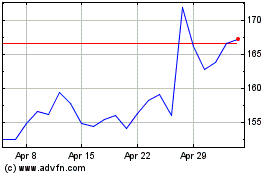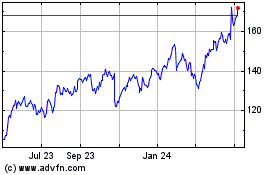By Jay Greene
Microsoft Corp. is moving to retool Cortana, its digital voice
assistant that has struggled as the software giant shackled it to
the personal computer.
When the assistant -- named after a character from the Xbox
videogame franchise "Halo" -- was introduced four years ago, it was
only available through the Windows operating system, a strategy
that hobbled Cortana as voice computing took off in a new era of
smart speakers.
Amazon.com Inc. introduced its Alexa digital assistant seven
months after Cortana's launch, but its Echo and sibling devices now
control two-thirds of the U.S. smart-speaker market, according to
research firm eMarketer. The market share of devices using Cortana
isn't large enough to be listed in eMarketer's tally.
Microsoft's effort to turn Cortana into a viable competitor,
while voice computing is still in its early days, is bigger than
just the market for smart speakers that sit on kitchen counters
checking the weather. It is an opportunity to lead in the next big
advance in computing, in which people use their voices rather than
a keyboard and mouse.
Companies that master so-called conversational computing will
have an edge in the emerging business just as Windows gave
Microsoft an advantage in the PC era, analysts say.
Microsoft is looking to get customers using Cortana when they
aren't sitting in front of their PCs, said David Ku, Microsoft vice
president. He declined to elaborate, but said one approach could
lead to customers using Cortana to access email in cars.
Cortana's overhaul effort is led by Javier Soltero, a senior
executive who came to Microsoft through a 2014 acquisition and has
become an internal advocate for new approaches at the 43-year-old
company. As a senior executive in the group behind Outlook, he
pushed to make the email and calendar app work well on Apple Inc.'s
iOS and the Android operating system from Google.
Mr. Soltero declined to be interviewed. A person familiar with
his plans expects him to provide more details regarding his Cortana
strategy early this fall.
Microsoft also hopes to boost Cortana use through a partnership
with Amazon. The deal provides each assistant with capabilities
they lack, giving Alexa, for example, access to Microsoft's widely
used Outlook calendar app, while letting Microsoft tap into
Amazon's pool of customers using voice-recognition gadgets and
Alexa's home-automation apps. The companies demonstrated how the
integration would work in May, and could roll out the service as
early as this week, the person familiar with the plans said.
So far, Microsoft's bid to move Cortana beyond Windows devices
has sputtered. Last year, Samsung Electronics Co.'s Harman Kardon
unit debuted a voice-enabled speaker running Cortana. The device
"went absolutely nowhere," said Gartner Inc. analyst Werner
Goertz.
Microsoft faces a chicken-or-egg challenge in winning over not
only consumers but the developers whose apps would make Cortana
more compelling. Developers question the merit of writing apps for
a platform few use.
"It's just not cost-effective," said Ahmed Bouzid, CEO of the
voice-app maker Witlingo. His company has created only two Cortana
apps, for the investor site Motley Fool and for a law firm.
It is a steep hill to catch Alexa. There are more than 40,000
so-called skills for the assistant, according to Amazon, letting
customers do everything from request an Uber car to order a
Domino's pizza. There are fewer than 300 Cortana skills.
Amazon is well ahead of Microsoft in building a technical and
marketing support system for developers, said Bob Stolzberg, CEO of
VoiceXP Inc., which has built Alexa voice apps for customers such
as CenturyLink Inc., but none for Cortana.
"Right now, Amazon is paving the way," Mr. Stolzberg said.
When Microsoft executives first introduced Cortana, they sought
to portray the tech giant as untethered from its stodgy past. The
digital assistant even joked on stage it was happy it wasn't named
"Microsoft Personal Assistant v. 1 service pack 2 2014." But at the
same time, they insisted Windows be the center of its universe.
"We thought, hey, if we just bootstrap off Windows everything
will be fine," Mr. Ku said.
Satya Nadella became Microsoft's CEO two months before the
Cortana launch. In his four-and-a-half-year tenure as chief
executive, he moved Microsoft away from its Windows-first approach,
beefing up its cloud-computing and productivity businesses and
capping that off by downgrading the operating system's role in a
March reorganization. But Microsoft's Cortana strategy remains a
vestige Mr. Nadella hasn't yet fixed.
About 148 million people or so use Cortana monthly, according to
Microsoft. But many of them type into a search box to draw on data
stored in Outlook email, address book and calendar apps and the
web, for example, rather than using its speech-recognition
capabilities.
Microsoft's rivals are racing to move beyond smart speakers.
Amazon has been working with Ford Motor Co. and BMW AG to integrate
Alexa into their cars. Alphabet Inc.'s Google Assistant works with
some LG Electronics Inc. appliances, letting customers find out
when a washing machine load will be done.
Write to Jay Greene at Jay.Greene@wsj.com
(END) Dow Jones Newswires
August 14, 2018 05:44 ET (09:44 GMT)
Copyright (c) 2018 Dow Jones & Company, Inc.
Alphabet (NASDAQ:GOOGL)
Historical Stock Chart
From Mar 2024 to Apr 2024

Alphabet (NASDAQ:GOOGL)
Historical Stock Chart
From Apr 2023 to Apr 2024
